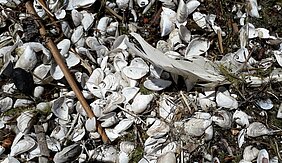Neobiota and especially neozoa can pose a potential threat to drinking water supplies, not only to drinking water quality, but also to the water supply assets like extraction pipes and treatment technology.
In the waters of Europe, there has been an increased occurrence of novel animal and plant species (neobiota) in recent decades. These can cause lasting changes to ecosystems and also lead to problems in water supply systems. Neobiota, and invasive neozoa in particular, can thus pose a potential threat to drinking water supplies, not only to quality, but also to the operation of the conveyance system and treatment stages.
In the project, the current state of knowledge on alien species in water bodies in Germany was compiled and summarized. Discussions with experts and water suppliers revealed that surface waters in particular are currently affected by alien species. Mussels in particular have proven to be especially problematic. Since the colonization of Lake Constance by the quagga mussel, there have been major problems at the waterworks on the lake, as the mussels colonize the raw water pipes and the downstream treatment plants. The removal of the mussels is associated with complex measures and additional costs running into millions.
Neophyte growth can also lead to problems for the water supply, as can mass proliferation of potentially toxin-producing algae or cyanobacteria, which could occur more frequently in the future due to climate change.
The increase in temperature in the drinking water distribution networks can lead to an increase in the number of reproduction cycles of invertebrates, so that they may reach critical biomasses.
Under certain circumstances, this can lead to hygienic contamination of drinking water, as invertebrates can be carriers of hygienically relevant bacteria such as coliform bacteria and enterococci. There is a need for further research in this area.
The topic of neobiota will continue to be the focus of research, science, nature conservation and water practice, as new invasive aquatic neobiota will continue to spread and even individual invasive species can have serious impacts on water supplies.
The project and its results are intended to support and promote the creation of water information on this topic in PK 1-3-17 "Neobiota".
Publication:
Hügler, M:
Neobiota: Gebietsfremde Tier- und Pflanzenarten in Gewässern – Was bedeutet das für die Wasserversorgung?
DVGW energie | wasser-praxis (EWP), 05/2024, Seiten 34 - 41 (2024)

![[Translate to English:] Prüfstelle-Produktprüfung_Teststand Test centre and product testing](/fileadmin/_processed_/0/9/csm_TZW-Karlsruhe_Pruefung_Geraete-Teststand_377188946c.jpg)
























